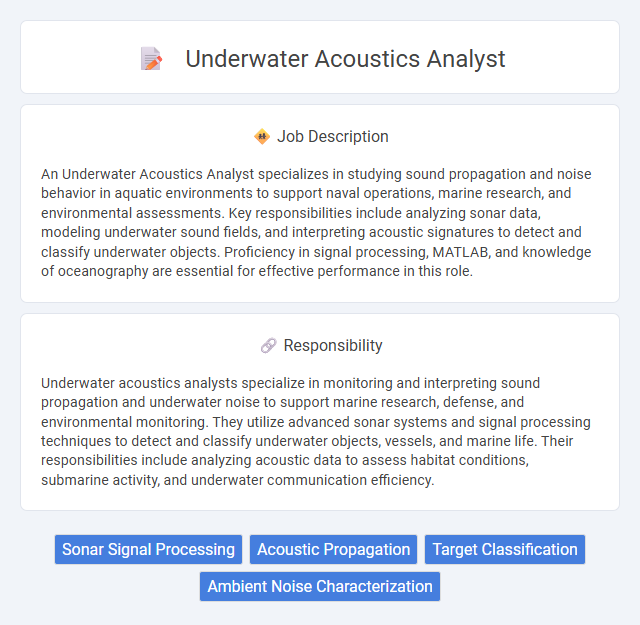
An Underwater Acoustics Analyst specializes in studying sound propagation and noise behavior in aquatic environments to support naval operations, marine research, and environmental assessments. Key responsibilities include analyzing sonar data, modeling underwater sound fields, and interpreting acoustic signatures to detect and classify underwater objects. Proficiency in signal processing, MATLAB, and knowledge of oceanography are essential for effective performance in this role.
Individuals with strong analytical skills and a keen interest in marine environments are likely suitable for an underwater acoustics analyst role. Those who are comfortable working with complex data, possess patience for detailed research, and adapt well to remote or confined settings may thrive in this field. Candidates who prefer dynamic team interactions over solitary, technical work might find the job less fitting.
Qualification
An Underwater Acoustics Analyst typically requires a strong background in physics, oceanography, or engineering, with expertise in acoustic signal processing and sonar systems. Proficiency in MATLAB, Python, or specialized simulation software is essential for modeling underwater sound propagation and analyzing acoustic data. Relevant qualifications often include a bachelor's or master's degree in acoustics, marine science, or electrical engineering, complemented by experience in underwater sensor technology and noise assessment.
Responsibility
Underwater acoustics analysts specialize in monitoring and interpreting sound propagation and underwater noise to support marine research, defense, and environmental monitoring. They utilize advanced sonar systems and signal processing techniques to detect and classify underwater objects, vessels, and marine life. Their responsibilities include analyzing acoustic data to assess habitat conditions, submarine activity, and underwater communication efficiency.
Benefit
An underwater acoustics analyst may likely experience benefits such as opportunities to work on cutting-edge sonar technology development and marine environmental monitoring. The role probably offers a blend of fieldwork and data analysis that enhances both technical expertise and problem-solving skills. Job stability and potential involvement in defense or research projects could also contribute to long-term career growth.
Challenge
Underwater acoustics analyst roles likely involve complex signal processing challenges due to the unpredictable nature of underwater environments and the interference from various noise sources. The probability of encountering data analysis difficulties increases with the variability of oceanic conditions, such as temperature, salinity, and pressure, which affect sound propagation. These challenges require advanced modeling skills and a strong understanding of acoustic theory to accurately interpret sonar and hydrophone data.
Career Advancement
An Underwater Acoustics Analyst leverages advanced signal processing and oceanographic data to interpret underwater sound propagation, crucial for naval and environmental applications. Career advancement often entails mastering machine learning algorithms and sonar system integration, leading to roles like Senior Acoustics Engineer or Research Director. Pursuing certifications in marine technology and participating in interdisciplinary projects can accelerate progression into leadership positions within defense contractors or marine research institutions.
Key Terms
Sonar Signal Processing
An Underwater Acoustics Analyst specializing in Sonar Signal Processing develops and optimizes algorithms to detect, classify, and track underwater objects using sonar data. Expertise in digital signal processing, acoustic wave propagation, and machine learning techniques is critical for enhancing sonar system performance in noisy and cluttered marine environments. Proficiency in MATLAB, Python, and advanced signal processing software drives innovation in sonar detection accuracy and underwater situational awareness.
Acoustic Propagation
An Underwater Acoustics Analyst specializing in Acoustic Propagation utilizes advanced signal processing techniques and oceanographic data to model sound wave behavior in marine environments. Expertise in sonar systems, waveguide theory, and environmental parameters enables accurate prediction of acoustic paths, crucial for naval defense and underwater communication. Proficiency in software tools like MATLAB and COMSOL enhances the analysis of sound speed profiles and reverberation patterns for operational effectiveness.
Target Classification
Underwater acoustics analysts specializing in target classification utilize advanced signal processing techniques to identify and categorize underwater objects based on acoustic signatures. They interpret sonar data to differentiate between marine life, man-made objects, and potential threats, enhancing situational awareness in naval operations. Expertise in machine learning algorithms and acoustic sensor technologies is critical for improving classification accuracy and operational effectiveness.
Ambient Noise Characterization
Underwater acoustics analysts specializing in ambient noise characterization measure and interpret background sound levels in various marine environments to assess their impact on sonar systems and marine life. They utilize advanced signal processing techniques and deployed hydrophone arrays to isolate and analyze natural and anthropogenic noise sources, including biological, meteorological, and human activities. Expertise in spectral analysis, statistical modeling, and acoustic propagation models is essential to develop accurate noise profiles that support naval operations and environmental monitoring.
 kuljobs.com
kuljobs.com